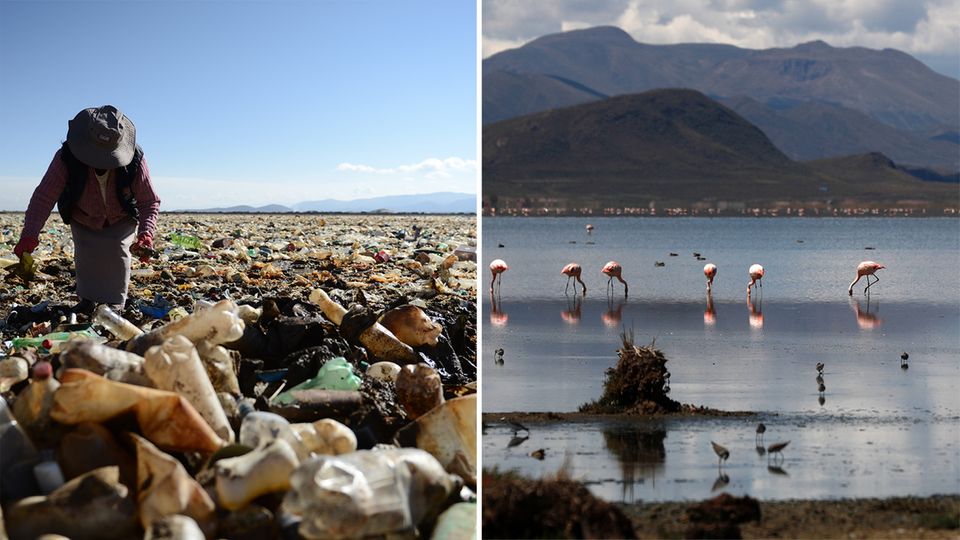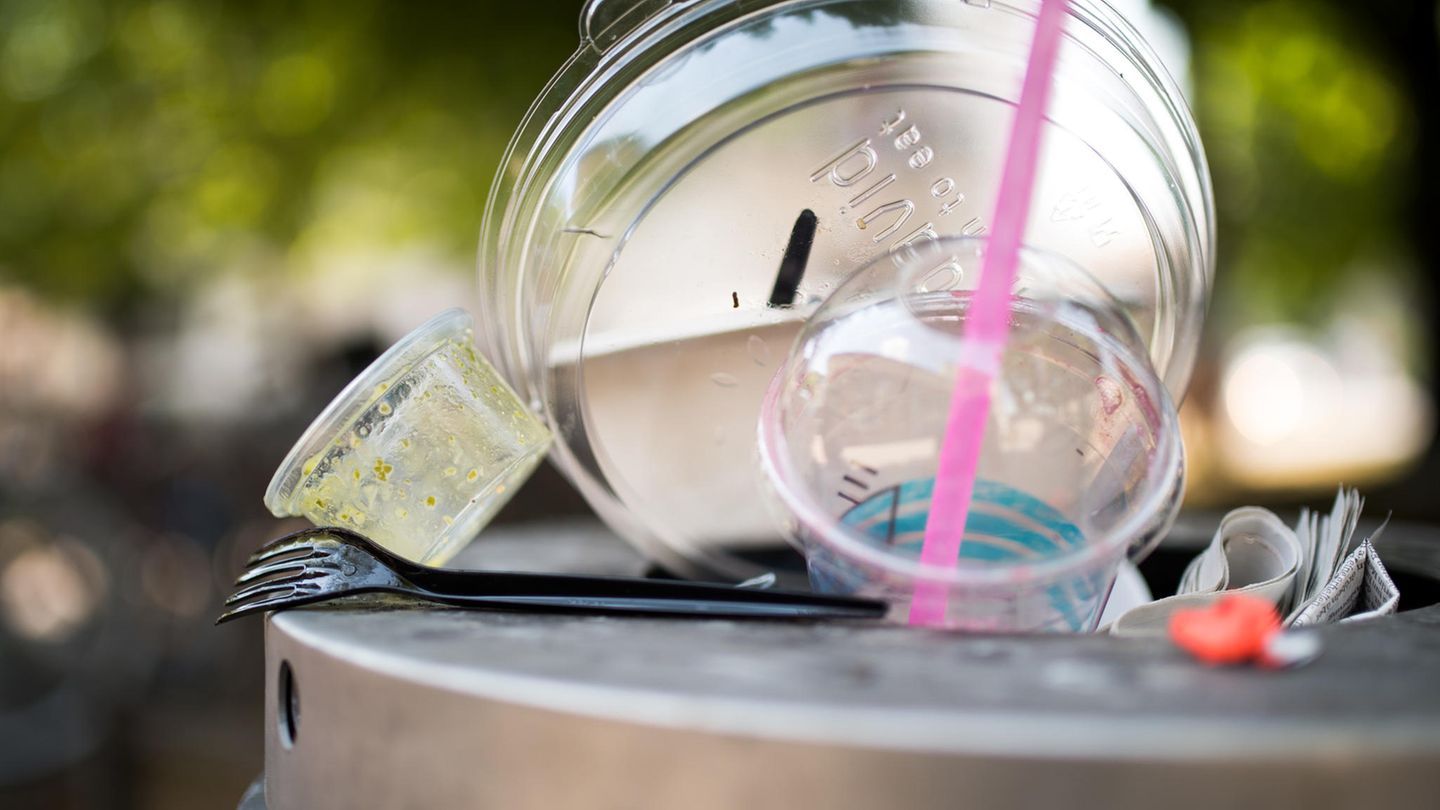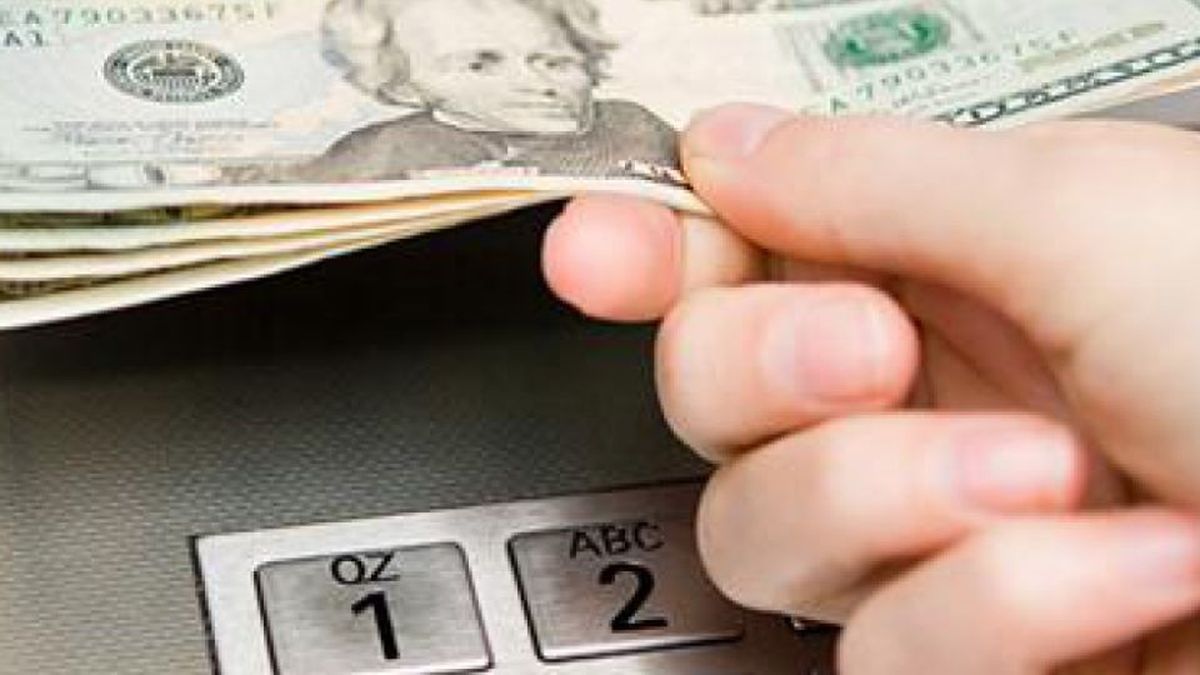Single-use plastic products can be found in parks, on streets and swim in the oceans. An EU-wide ban to reduce plastic will come into effect this Saturday. A change that also harbors risks.
The change has been initiated – and is now officially sealed. Plastic dishes and other single-use products should disappear from all shelves in Germany from Saturday. Plates, knives, forks, cotton swabs, straws, balloon sticks – the EU-wide ban affects many familiar products that shops of all kinds are still selling day after day.
The EU also wants to ban to-go cups, fast food packaging and disposable polystyrene containers from the market. Overall, the plastics directive from 2019, which every member state must implement from July 3, includes the following products, which countries are either no longer allowed to circulate or which they must take special measures to reduce:
- Cutlery and plates, drinking straws, stir sticks, cotton swabs and balloon sticks made of plastic;
- Disposable plates and bowls made of cardboard as soon as they consist to a small extent of plastic or are covered with plastic;
- Disposable plates, cups or cutlery made of bio-based or biodegradable plastics;
- To-go containers and to-go drinks cups made of styrofoam.
70 percent of all marine litter
The products listed together with fishing gear make up 70 percent of all marine litter in the EU. A man-made catastrophe for the environment – which can also be traced back to articles for which there are no adequate alternatives made from other materials. These are, for example, sanitary towels, cigarettes with filters made of plastic or to-go cups made of or with plastic. This is the group of products for which no ban is planned due to the lack of alternatives. In Germany, however, you will receive a new label from Saturday that will warn consumers of the environmental damage and give tips on disposal. Federal Environment Minister Svenja Schulze (SPD) calls the innovations “an important step out of the throw-away society”.
320,000 disposable cups per hour
According to the Ministry of the Environment in Germany, around 320,000 disposable cups are used for coffee and the like every hour. In 2017, to-go packaging and disposable tableware accounted for more than 346,000 tonnes of waste. According to the Federal Environment Agency, there are no more recent figures.
The Association of Municipal Companies assumes that the products covered by the EU plastics directive account for around 20 percent of street waste. “So far, their disposal has been financed entirely through street cleaning fees or municipal budgets and thus passed on to the general public,” says VKU Vice President Patrick Hasenkamp. He is relieved about the EU-wide ban on plastic items. It strengthens “the municipal city cleaners to fight against the litter” and ensures cleaner cities, says Hasenkamp.
Municipal cleaning companies in particular are “the ones who suffer from the to-go boom”. You would struggle with increasing costs to remove the litter from public spaces. That costs around 700 million euros per year.
The rest of the plastic items can still be sold
It is difficult to assess whether these costs will fall so quickly. Because the rest of the plastic dishes that shops, takeaways and restaurants still have in their warehouses can still be sold after July 3rd. The same applies to all other products that are banned from now on – on the other hand, “placing on the market”, ie importing the products or bringing them onto the market, is strictly prohibited, as the EU Parliament clarifies upon request.
The German Trade Association (HDE) does not assume that the remaining stocks are “larger quantities”. But he cannot put a precise figure on the magnitude. Overall, the retailers in Germany have already taken precautions in the past few months to switch to the alternatives, a spokesman said.
Substitute products are not necessarily better
The substitute products that have been on the shelves for a long time include forks made of bamboo or straws made of paper. These are not always healthy options, warn consumer advocates. In some cases, alternative cutlery and containers are contaminated with chemicals and are also not completely biodegradable, recently criticized the European consumer association BEUC.
The Federation of German Consumer Organizations points out further hurdles on its website. For example, the obvious idea of simply replacing plastic with paper for the deforestation of forests, which play a key role in climate protection. The headquarters advises against aluminum trays because of the high energy consumption.
The plastic ban is not enough – a rethink is needed
So everything is much more complicated than you thought? Environment Minister Schulze repeatedly emphasizes that it is also a question of mentality that has to change. The best alternative is not to use single-use products in the first place and to use products several times, says the minister.
During her tenure, Schulze initiated a legal basis that is intended to help this rethinking process: From 2023 caterers, delivery services and restaurants in Germany will be obliged to offer non-reusable containers as an alternative to disposable items. Another step that should point the way out of the throwaway society.

David William is a talented author who has made a name for himself in the world of writing. He is a professional author who writes on a wide range of topics, from general interest to opinion news. David is currently working as a writer at 24 hours worlds where he brings his unique perspective and in-depth research to his articles, making them both informative and engaging.




